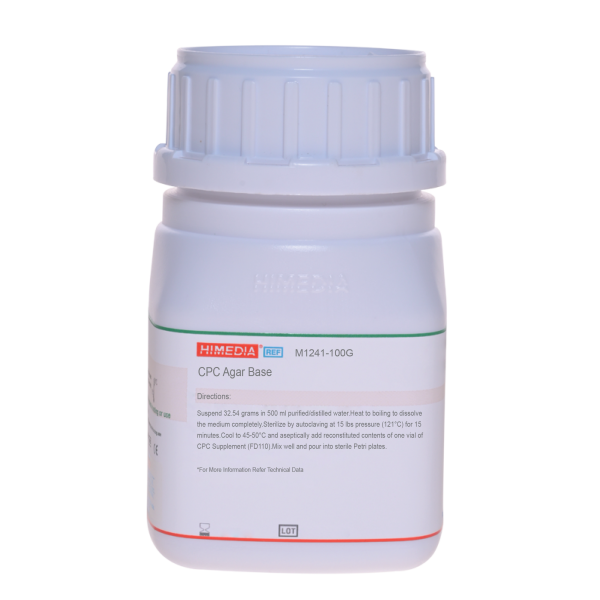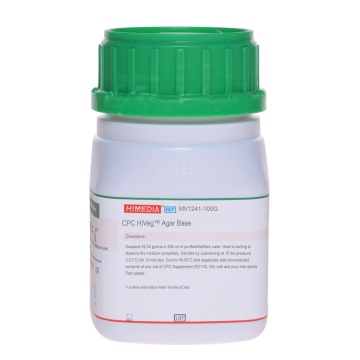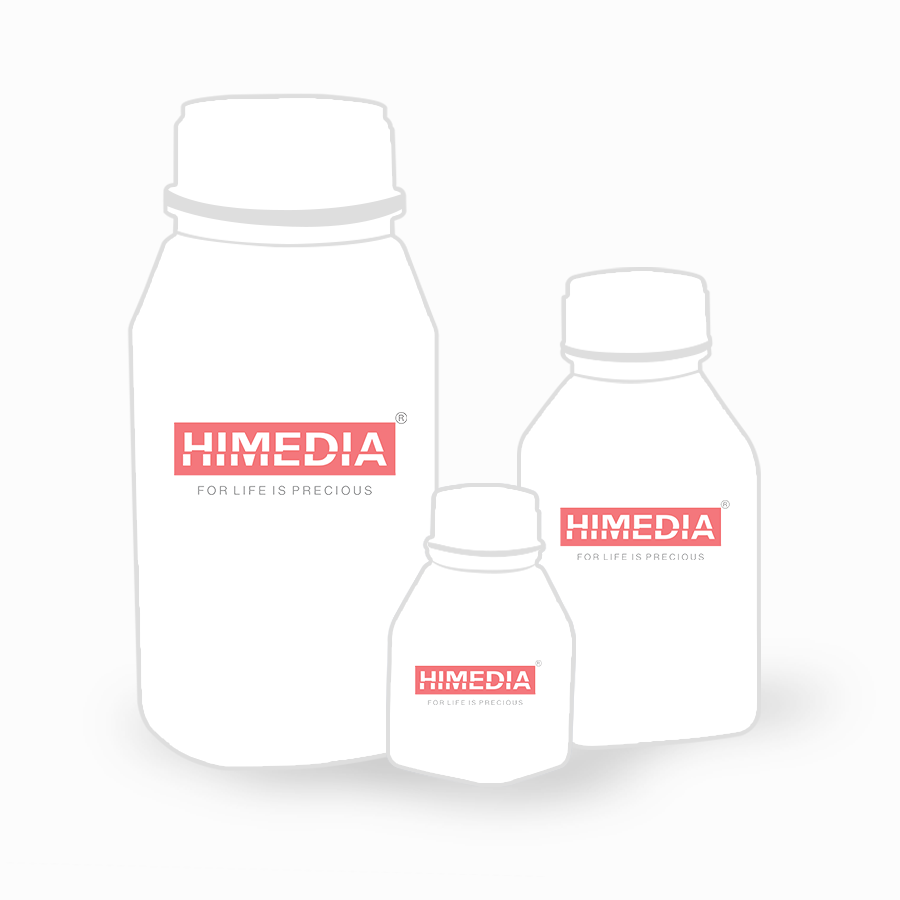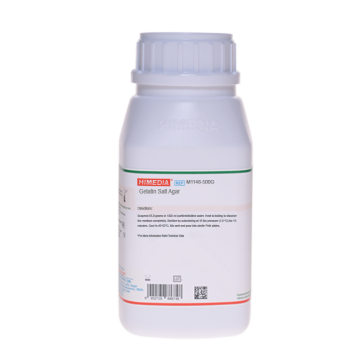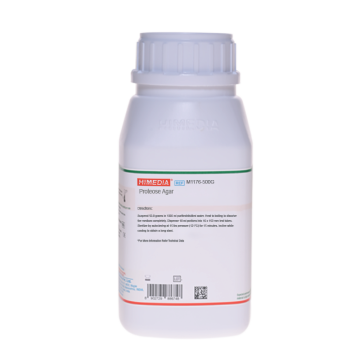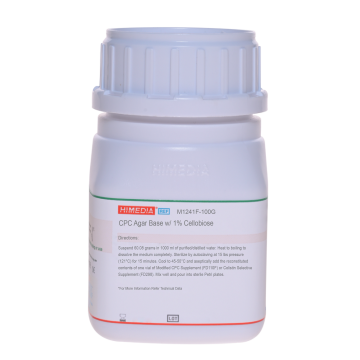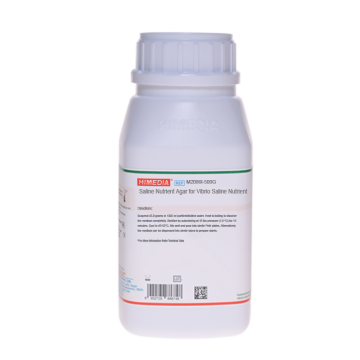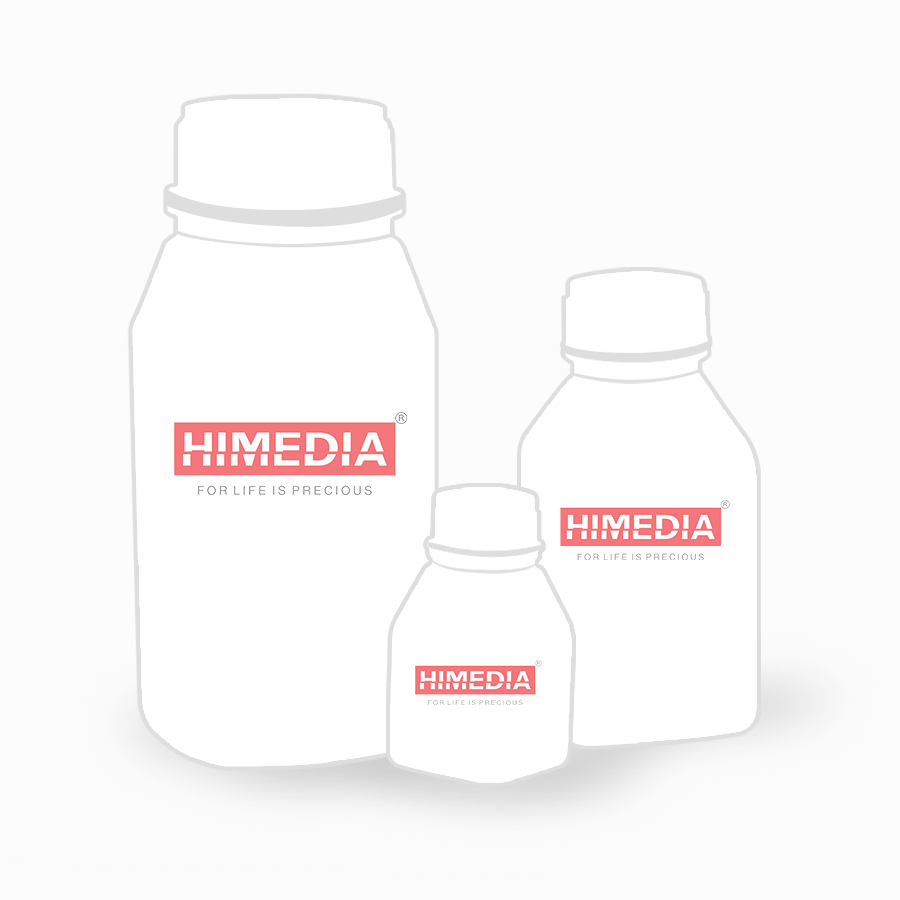 Your enquiry has been submitted
Your enquiry has been submitted
CPC Agar Base
Intended Use
Recommended for the cultivation and identification of Vibrio species from food samples.
Composition
| Ingredients | Gms / Litre |
|---|---|
| Peptone | 10.000 |
| HM peptone B # | 5.000 |
| Cellobiose | 15.000 |
| Sodium chloride | 20.000 |
| Bromothymol blue | 0.040 |
| Cresol red | 0.040 |
| Agar | 15.000 |
Final pH (at 25°C): 7.6±0.2
**Formula adjusted, standardized to suit performance parameters
# Equivalent to Beef extract
Directions
Suspend 32.54 grams in 500 ml of purified / distilled water. Heat to boiling to dissolve the medium completely. Sterilize by autoclaving at 15 lbs pressure (121°C) for 15 minutes. Cool to 45-50°C and aseptically add the rehydrated contents of 1 vial of CPC Supplement (FD110). Mix well and pour into sterile Petri plates
Principle And Interpretation
Vibrio species are natural inhabitants of brackish and salt water. Human disease is associated with ingestion of contaminated water or consumption of contaminated seafood. Wound and systemic infections develop following contact with contaminated water (5). CPC (Cellobiose, Polymyxin and Colistin) Agar Base formulated as per APHA (7) is recommended for the cultivation and identification of Vibrio species from foods. CPC Agar is a selective and differential agar medium, designed to differentiate Vibrio vulnificus from other Vibrios (7). Vibrio cholerae strains except V. cholerae 01-classical biotype grow on CPC Agar while most Vibrio parahaemolyticus strains do not grow on CPC Agar.
CPC Agar contains HM peptone B and peptone, which supply the essential nitrogenous, carbonaceous compounds, long chain amino peptides, vitamins and other growth nutrients to Vibrios. Cellobiose is fermented by some Vibrios producing acid and is indicated by the pH indicator bromothymol blue, which turns yellow at acidic pH. Cresol red is the pH indicator of alkaline range, which turns red at alkaline pH. Alkaline pH of the medium enhances the recovery of Vibrios.
Blend approximately 25 grams of food sample with 225 ml Alkaline Peptone Water (M618). Transfer a loopful from the surface growth of either Alkaline Peptone Water (M618) or Gelatin Phosphate Salt Broth to the surface of the dried plates of CPC Agar. Streak in a manner that will yield isolated colonies. Incubate CPC Agar at 40 - 42°C for 18 to 24 hours.
Typical colonies of V. cholerae on CPC Agar are small, smooth, opaque and green to purple in colour as CPC Agar contains two pH indicators viz. bromothymol blue and cresol red. A purple background will also develop in the CPC Agar upon extended incubation.
Type of specimen
Food; Water samples.
Specimen Collection and Handling
For food and dairy samples, follow appropriate techniques for sample collection and processing as per guidelines (1,6,8).
For water samples, follow appropriate techniques for sample collection, processing as per guidelines and local standards.(2)
After use, contaminated materials must be sterilized by autoclaving before discarding.
Warning and Precautions :
Read the label before opening the container. Wear protective gloves/protective clothing/eye protection/ face protection. Follow good microbiological lab practices while handling specimens and culture. Standard precautions as per established guidelines should be followed while handling specimens. Safety guidelines may be referred in individual safety data sheets.
Limitations :
- 1. V. cholerae on CPC Agar are small, smooth, opaque and green to purple in colour as CPC Agar contains two pH indicators viz. bromothymol blue and cresol red.
- 2. A purple background will develop if incubation gets protracted.
Performance and Evaluation
Performance of the medium is expected when used as per the direction on the label within the expiry period when stored at recommended temperature.
Quality Control
Appearance: Light yellow to light brown homogeneous free flowing powder
Gelling: Firm, comparable with 1.5% Agar gel
Colour and Clarity of prepared medium: Olive-green to light brown coloured, clear to slightly opalescent gel forms in Petri plates
Reaction: Reaction of 6.5% w/v aqueous solution at 25°C. pH: 7.6±0.2
pH: 7.40-7.80
Cultural Response
Cultural characteristics observed after an incubation at 40±2°C for 18-24 hours.
| Organism | Inoculum (CFU) | Growth | Recovery | Colour of colony |
|---|---|---|---|---|
| Vibrio cholerae ATCC 15748 | 50-100 | good - luxuriant>=50% | green-purple | |
| Vibrio parahaemolyticus ATCC 17802 (00037*) | >=104 | inhibited | 0% | |
| Vibrio vulnificus | 50-100 | good - luxuriant>=50% | yellow |
Key: *Corresponding WDCM numbers.
Storage and Shelf Life
Store between 10-30°C in a tightly closed container and the prepared medium at 2-8°C. Use before expiry date on the label. On opening, product should be properly stored dry, after tightly capping the bottle in order to prevent lump formation due to the hygroscopic nature of the product. Improper storage of the product may lead to lump formation. Store in dry ventilated area protected from extremes of temperature and sources of ignition Seal the container tightly after use.
Product performance is best if used within stated expiry period.
Disposal
User must ensure safe disposal by autoclaving and/or incineration of used or unusable preparations of this product. Follow established laboratory procedures in disposing of infectious materials and material that comes into contact with sample must be decontaminated and disposed of in accordance with current laboratory techniques (3,4).
Reference
- American Public Health Association, Standard Methods for the Examination of Dairy Products, 1978, 14th Ed., Washington D.C.
- Baird R.B., Eaton A.D., and Rice E.W., (Eds.), 2015, Standard Methods for the Examination of Water and Wastewater, 23rd ed., APHA, Washington, D.C.
- Isenberg, H.D. Clinical Microbiology Procedures Handbook. 2nd Edition.
- Jorgensen, J.H., Pfaller, M.A., Carroll, K.C., Funke, G., Landry, M.L., Richter, S.S and Warnock., D.W. (2015) Manual of Clinical Microbiology, 11th Edition. Vol. 1.
- Murray P. R., Baron J. H., Pfaller M. A., Jorgensen J. H. and Yolken R. H., (Ed.), 2003, Manual of Clinical Microbiology, 8th Ed., American Society for Microbiology, Washington, D.C.
- Salfinger Y., and Tortorello M.L., 2015, Compendium of Methods for the Microbiological Examination of Foods, 5th Ed., American Public Health Association, Washington, D.C.
- Vanderzant C. and Splittstoesser D. F., (Eds), 1992, Compendium of Methods for the Microbiological Examination of Foods, 3rd Ed., APHA, Washington DC.
- Wehr H. M. and Frank J. H., 2004, Standard Methods for the Microbiological Examination of Dairy Products, 17th Ed., APHA Inc., Washington, D.C.
| Product Name | CPC Agar Base |
|---|---|
| SKU | M1241 |
| Product Type | Regular |
| Physical Form | Powder |
| Origin | Animal |
| Packaging type | HDPE |
| References | 1. American Public Health Association, Standard Methods for the Examination of Dairy Products, 1978, 14th Ed., Washington D.C. |
| Customized Product Available | No |



